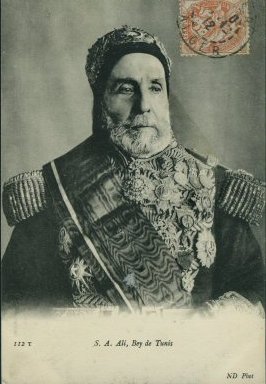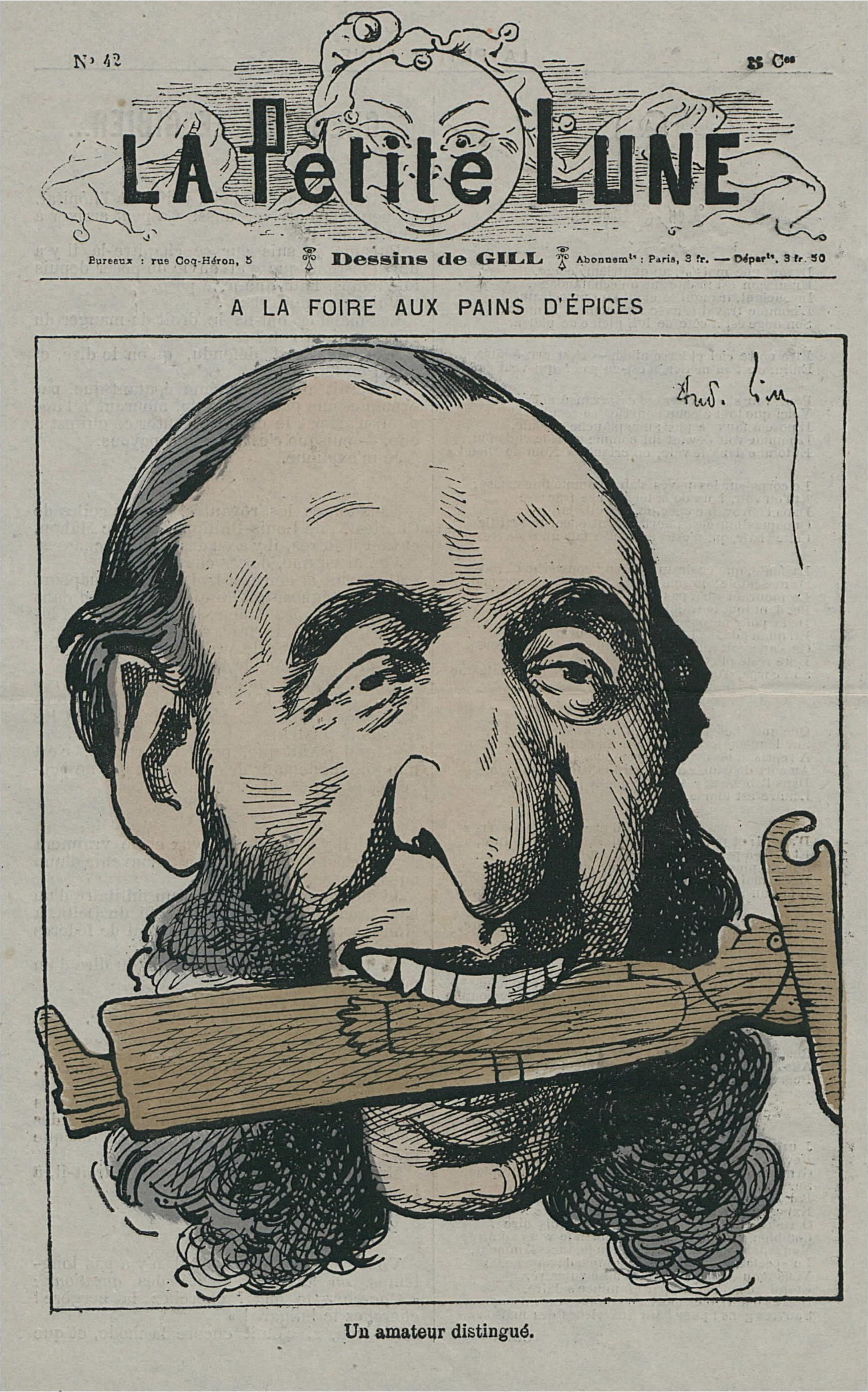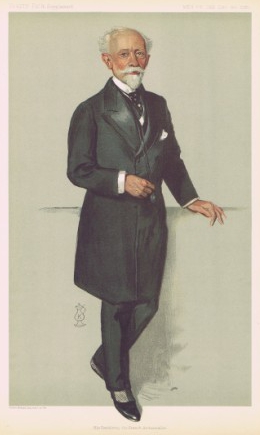|
Ali III Ibn Al-Husayn
Ali Bey ( ar, أبو الحسن علي باشا باي بن الحسين) (14 August 1817 – 11 June 1902) was the Husainid Bey of Tunis from 1882 until his death. He was the first ruler under the French protectorate. He was named Bey al-Mahalla (Heir Apparent) on 23 August 1863 by his brother Muhammad III as-Sadiq and was made a divisional General and placed at the head of an army column operating in the interior of the country (known in Tunisian Arabic as the ''mhalla'') to assert beylical authority in remote regions, rendering justice in the name of the sovereign and collecting taxes from local tribes. A keen horseman, Ali Bey took personal charge of this work and undertook it thoroughly, twice a year - in the north of the country during the summer in Béja and El Kef, and in the south during the winter, in Kairouan and the towns further south. During the Mejba Revolt in 1864, while his ineffective brother remained in the Bardo palace, Ali put down the rebellion with Ge ... [...More Info...] [...Related Items...] OR: [Wikipedia] [Google] [Baidu] |
Bey Of Tunis
Bey ( ota, بك, beğ, script=Arab, tr, bey, az, bəy, tk, beg, uz, бек, kz, би/бек, tt-Cyrl, бәк, translit=bäk, cjs, пий/пек, sq, beu/bej, sh, beg, fa, بیگ, beyg/, tg, бек, ar, بك, bak, gr, μπέης) is a Turkic title for a chieftain, and an honorific, traditionally applied to people with special lineages to the leaders or rulers of variously sized areas in the numerous Turkic kingdoms, emirates, sultanates and empires in Central Asia, South Asia, and the Middle East, such as the Ottomans, Timurids or the various khanates and emirates in Central Asia and the Eurasian Steppe. The feminine equivalent title was begum. The regions or provinces where "beys" ruled or which they administered were called ''beylik'', roughly meaning "governorate" and/or "region" (the equivalent of county in other parts of Europe). However the exact scope of power handed to the beks (alternative spelling to beys) varied with each country, thus there was no cle ... [...More Info...] [...Related Items...] OR: [Wikipedia] [Google] [Baidu] |
French Conquest Of Tunisia
The French conquest of Tunisia occurred in two phases in 1881: the first (28 April – 12 May) consisting of the invasion and securing of the country before the signing of a treaty of protection, and the second (10 June – 28 October) consisting of the suppression of a rebellion. The French protectorate of Tunisia that was established lasted until the independence of Tunisia on 20 March 1956. Context Early contacts Tunisia had been a province of the Ottoman Empire since the Conquest of Tunis (1574), although with great autonomy under the authority of a Bey. In 1770, Brigadier Rafélis de Broves bombarded the cities of Bizerte, Porto Farina and Monastir in retaliation for acts of piracy.. In the 19th century Tunisian commercial contacts with Europe were numerous, and there was a population of French, Italian and British expatriates in the country, that represented by Consulates. France had also made a major loan to Tunisia in the mid-19th century. The Tunisian governme ... [...More Info...] [...Related Items...] OR: [Wikipedia] [Google] [Baidu] |
Souks
A bazaar () or souk (; also transliterated as souq) is a marketplace consisting of multiple small stalls or shops, especially in the Middle East, the Balkans, North Africa and India. However, temporary open markets elsewhere, such as in the West, might also designate themselves as bazaars. The ones in the Middle East were traditionally located in vaulted or covered streets that had doors on each end and served as a city's central marketplace. Street markets are the European and North American equivalents. The term ''bazaar'' originates from Persian, where it referred to a town's public market district. The term bazaar is sometimes also used to refer to the "network of merchants, bankers and craftsmen" who work in that area. The term ''souk'' comes from Arabic and refers to marketplaces in the Middle East and North Africa. Evidence for the existence of bazaars or souks dates to around 3,000 BCE. Although the lack of archaeological evidence has limited detailed studie ... [...More Info...] [...Related Items...] OR: [Wikipedia] [Google] [Baidu] |
Jules Ferry
Jules François Camille Ferry (; 5 April 183217 March 1893) was a French statesman and republican philosopher. He was one of the leaders of the Moderate Republicans and served as Prime Minister of France from 1880 to 1881 and 1883 to 1885. He was a promoter of laicism and colonial expansion. Under the Third Republic, Ferry made primary education free and compulsory through several new laws. However, he was forced to resign following the Sino-French War in 1885 due to his unpopularity and public opinion against the war. Biography Early life and family Ferry was born Saint-Dié, in the Vosges department, to Charles-Édouard Ferry, a lawyer from a family that had established itself in Saint-Dié as bellmakers, and Adélaïde Jamelet. His paternal grandfather, François-Joseph Ferry, was mayor of Saint-Dié through the Consulate and the First Empire. He studied law, and was called to the bar at Paris in 1854, but soon went into politics, contributing to various newspape ... [...More Info...] [...Related Items...] OR: [Wikipedia] [Google] [Baidu] |
Léonard-Léopold Forgemol De Bostquénard
Léonard-Léopold Forgemol de Bostquénard (1821–1897) was a general in the French Army. Biography Léonard-Léopold Forgemol de Bostquénard was born on 17 September 1821 at Azerables, in the Creuse department and died on 28 November 1897 at Versailles. He graduated from the military school of Saint-Cyr in 1839 and was posted to Algeria in 1840 as an infantry lieutenant, eventually attaining the rank of colonel. At the start of the Franco-Prussian War, in 1870, he was recalled to France. Provisionally ranked as a brigadier general on January 30, 1871, he was made up to the permanent position in the following September. He commanded a subdivision of the department of Aisne with the subsidiary role of secretary of the War Council and in 1878, he was put in military command of the department of Seine-et-Oise. He was promoted to divisional general on March 4, 1879. An injury that he received during the war obliged him to wear a large silver plastron over his abdomen. He ... [...More Info...] [...Related Items...] OR: [Wikipedia] [Google] [Baidu] |
Conventions Of La Marsa
The Conventions of La Marsa ( ar, اتفاقية المرسى) supplementing the Treaty of Bardo were signed by the Bey of Tunis Ali III ibn al-Husayn and the French Resident General Paul Cambon on 8 June 1883. They provided for France to repay Tunisia's international debt so it could abolish the International Debt Commission and thereby remove any obstacles to a French protectorate in Tunisia. It was in the Conventions of La Marsa that the term 'protectorate' was first employed to describe the relationship between France and the Regency of Tunis. As the first protectorate to be established, Tunisia provided a working model for later French interventions in Morocco and Syria. Background When they first occupied Tunisia in 1881, the French had compelled the Bey, Muhammad III as-Sadiq, to sign the Treaty of Bardo. To avoid provoking a reaction from other European powers with an interest in the country, the terms of this treaty were very limited. They allowed French military ... [...More Info...] [...Related Items...] OR: [Wikipedia] [Google] [Baidu] |
Paul Cambon
Pierre Paul Cambon (20 January 1843 – 29 May 1924) was a French diplomat and brother to Jules Cambon. Biography Cambon was born and died in Paris. He was called to the Parisian bar, and became private secretary to Jules Ferry in the '' préfecture'' of the Seine. After ten years of administrative work in France as secretary of ''préfecture'', and then as prefect successively of the '' départements'' of Aube (1872), Doubs (1876), Nord (1877–1882), he exchanged into the diplomatic service, being nominated French minister plenipotentiary at Tunis, fulfilling two terms as Resident-General. In 1886 Cambon became French ambassador to Madrid; was transferred to Constantinople in 1890, and in 1898 to London, where he served until 1920. In London, Cambon quickly became an important figure, helping to negotiate the Entente Cordiale between Britain and France in 1904, and serving as the French representative at the London Conference which resolved the Balkan Wars betwe ... [...More Info...] [...Related Items...] OR: [Wikipedia] [Google] [Baidu] |
List Of French Residents-general In Tunisia
In 1881, the conquest of Tunisia was initiated by the French Third Republic. The invasion began on 28 April 1881, and lasted until 28 October 1881. Meanwhile, the Treaty of Bardo was signed on 12 May 1881. According to the treaty, the Beylik of Tunis would become a French protectorate from 1881 to 1956, when Tunisia regained its independence as the Kingdom of Tunisia. List (Dates in italics indicate ''de facto'' continuation of office) See also * Beylik of Tunis * Kingdom of Tunisia * French Algeria ** List of French governors of Algeria * French protectorate in Morocco ** List of French residents-general in Morocco In 1911, the conquest of Morocco was initiated by the French Third Republic, in the aftermath of the Agadir Crisis. While the conquest itself lasted until 1934, the Treaty of Fes was signed on 30 March 1912. According to the treaty, most of M ... Sources * http://www.rulers.org/rult.html#tunisia * ''African States and Rulers, John Stewart, McFarland' ... [...More Info...] [...Related Items...] OR: [Wikipedia] [Google] [Baidu] |
Mohammed Aziz Bouattour
Mohammed Aziz Bouattour ( ar, محمد العزيز بوعتور; born 1825 in Tunis, died in 1907 in La Marsa), was Prime Minister of the Beylik of Tunis from 1882 to 1907. Early life He was born in the family home of the Rue du Pacha in Tunis, the Dar Ben Achour. He came from a patrician family descended from the third caliph Uthman that had originated in Sfax in the before moving to Tunis at the end of the 18th century. His education at the Zaytuna Mosque began in 1839, and here he studied Arabic and the Sharia from distinguished scholars such as Sidi Ibrahim al-Riahi, Muhammad al-Shazli bin Saleh and Muhammad al-Taher ibn Ashour. His grandfather and his uncles had reach high positions in the society of Tunis as notaries and in the state chancellery (''diwan al-insha’ ''). Bouattour followed their example and became secretary of the chancellery under the direction of the first secretary (bach kateb), Mohamed Lasram IV. When Lasram died in 1861, the private secretary of th ... [...More Info...] [...Related Items...] OR: [Wikipedia] [Google] [Baidu] |
Grand Vizier
Grand vizier ( fa, وزيرِ اعظم, vazîr-i aʾzam; ota, صدر اعظم, sadr-ı aʾzam; tr, sadrazam) was the title of the effective head of government of many sovereign states in the Islamic world. The office of Grand Vizier was first held by officials in the later Abbasid Caliphate. It was then held in the Ottoman Empire, the Mughal Empire, the Sokoto Caliphate the Safavid Empire and Morocco. In the Ottoman Empire, the Grand Vizier held the imperial seal and could convene all other viziers to attend to affairs of the state; the viziers in conference were called "''Kubbealtı'' viziers" in reference to their meeting place, the ''Kubbealtı'' ('under the dome') in Topkapı Palace. His offices were located at the Sublime Porte. Today, the Prime Minister of Pakistan is referred to in Urdu as ''Wazir-e-azam'', which translates literally to Grand Vizier. Initially, the Grand Viziers were exclusively of Turk origin in the Ottoman Empire. However, after there were troubles b ... [...More Info...] [...Related Items...] OR: [Wikipedia] [Google] [Baidu] |
Mohammed Khaznadar
Mohammed Khaznadar ( ar, محمد خزندار; born around 1810 on the island of Kos (modern Greece)Jean Ganiage, ''Les origines du Protectorat français en Tunisie (1861-1881)'', éd. Maison tunisienne de l'édition, Tunis, 1968, p. 592 and died on 1889 at La Marsa was a Tunisian politician. Biography A Mamluk of Greek origin, he was captured in a raid and bought as a slave by the Bey of Tunis: Hussein II Bey. Later on he became treasurer to Chakir Saheb Ettabaâ and was qaid of Sousse and Monastir from 1838. He remained for fifty years in one post or another in the service of five successive beys. In November 1861 he was named Minister of the Interior, then Minister of War in December 1862, Minister of the Navy in September 1865, Minister of the Interior again in October 1873 and finally Prime Minister and President of the International Financial Commission from 22 July 1877 to 24 August 1878. He retained also the title of minister and the functions of a councillor of st ... [...More Info...] [...Related Items...] OR: [Wikipedia] [Google] [Baidu] |


.jpeg/1200px-Turkey_(68742801).jpeg)




